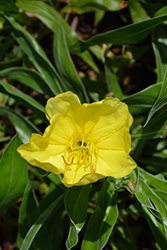Height: 8 inches
Spacing: 12 inches
Sunlight:
![]()
Hardiness Zone: 3b
Other Names: Missouri Evening Primrose, Oenothera macrocarpa
Description:
A vigorous trailing plant with lance shaped green foliage with white midribs; sunny yellow, cup shaped flowers bloom over a long season; seed pods can be dried for floral arrangements; perfect for rock gardens or border fronts
Ornamental Features
Ozark Sundrops has masses of beautiful lightly-scented lemon yellow cup-shaped flowers along the stems from early to late summer, which are most effective when planted in groupings. Its narrow leaves remain emerald green in colour with pointy white spines throughout the season.
Landscape Attributes
Ozark Sundrops is an herbaceous perennial with a ground-hugging habit of growth. Its medium texture blends into the garden, but can always be balanced by a couple of finer or coarser plants for an effective composition.
This plant will require occasional maintenance and upkeep, and is best cleaned up in early spring before it resumes active growth for the season. Gardeners should be aware of the following characteristic(s) that may warrant special consideration;
- Self-Seeding
Ozark Sundrops is recommended for the following landscape applications;
- Mass Planting
- Rock/Alpine Gardens
- Border Edging
- General Garden Use
- Groundcover
- Naturalizing And Woodland Gardens
Planting & Growing
Ozark Sundrops will grow to be about 8 inches tall at maturity, with a spread of 16 inches. When grown in masses or used as a bedding plant, individual plants should be spaced approximately 12 inches apart. Its foliage tends to remain low and dense right to the ground. It grows at a medium rate, and under ideal conditions can be expected to live for approximately 10 years. As an herbaceous perennial, this plant will usually die back to the crown each winter, and will regrow from the base each spring. Be careful not to disturb the crown in late winter when it may not be readily seen!
This plant should only be grown in full sunlight. It prefers dry to average moisture levels with very well-drained soil, and will often die in standing water. It is considered to be drought-tolerant, and thus makes an ideal choice for a low-water garden or xeriscape application. It is not particular as to soil pH, but grows best in sandy soils. It is somewhat tolerant of urban pollution. This species is native to parts of North America.
This plant is not reliably hardy in our region, and certain restrictions may apply; contact the store for more information.

